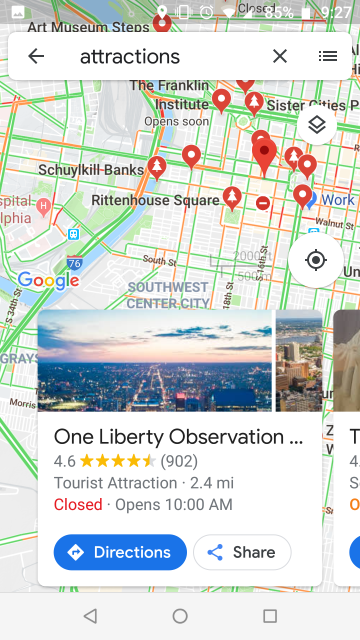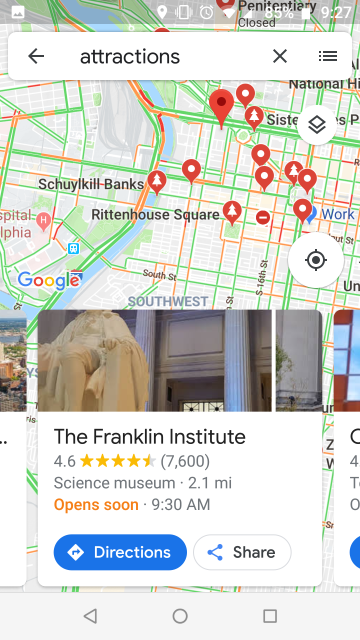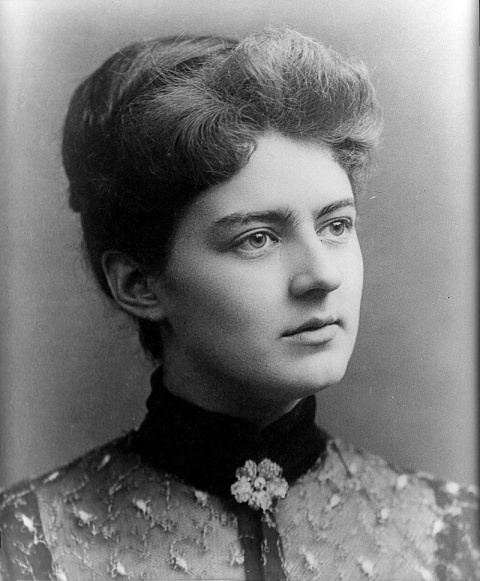Mark Dominus (陶敏修)
mjd@plover.com
I have another blog that doesn't suck.
Archive:
| 2023 | JF |
| 2022: | JFMAMJ |
| JASOND | |
| 2021: | JFM |
| 2020: | JFMAMJ |
| JASOND | |
| 2019: | JFMAMJ |
| JASOND | |
| 2018: | JFMAMJ |
| JASOND | |
| 2017: | ND |
Comments disabled
From now on whenever anyone says “shibboleth” I'm going to correct their pronunciation. “That’s actually pronounced ‘sibboleth’.”
Hilarious! I wish I'd thought of this years ago.
A former classmate of mine is a writer. I asked him how it was going.
“Well,” he said, “One of my short stories was nominated for a Hugo.”
“Awesome! Are you going to win?”
“No.” He shrugged, and explained: “Ted Chiang wrote a story this year.”
"Sunk Cost Fallacy" would be a good name for a yacht.
Google Maps has a new button that says “attractions”. I clicked it to see what attractions were near me. It just does a canned search for “attractions”.

But there must be some sort of metadata, because the canned search has found the Liberty Place observation deck, very nice.

Also it found the Franklin Institute, home of the Benjamin Franklin national memorial.

And of course it also found this barber shop that happens to have “Attraction” in its name.
Sometimes Philadelphia can seem really small. Last night I went to a Secret Cinema show. Secret Cinema is this guy named Jay Schwartz who owns a large collection of obscure films and some film projectors, and who puts on a film show every so often. Secret Cinema is where I saw Billy Jack.
Last night's show was a bunch of short comedy films from the 1930s. (Most of which I thought were awful.) Afterward I went to the Secret Cinema web site to find out more about what I had seen, and I noticed this item at the very bottom of the page:

The name Rodney Linderman rang a bell, but it took a minute before I could put my finger on it. Rodney Linderman is better known as Rodney Anonymous and is the front man for the Dead Milkmen.
Even if the chariots were an anachronism in chess at the time it was invented, maybe it's not so strange. Indian legend is still full of chariots. For example, Krishna served as the charioteer for Arjuna in Mahabharata. In the Ramayana, Lord Indra himself sends his charioteer, Matali, to assist Rama. Maybe they put the chariots in because they were cool, the way we have videogames about fighting with giant swords even though nobody around here has done that for a long time.
Then when the game came to Europe, where chariots were unknown even in legend, so they decided to change them. To the always perplexing castles or towers. Because apparently the European mind had an easier time accepting a tower scooting around the board than a horse-drawn cart with an archer in it.
Europeans can be pretty weird.
It occurs to me that the “chaudhur” in “Chaudhuri” is also the same as in the name of chaturanga, which is the original name for the game of chess. It refers to the four components of the army. (In the original game, there were infantry, cavalry, elephants, and chariots.) I think that in Persian the name is still the same, shatranj.
Today I went to check in for a flight to Los Angeles. They must have overbooked, because one of the things they showed me was this:

Now my question is, what exactly is the meaning of “exclusive” here?
My web browser has this feature where it remembers what you put in a form and then when it sees you are filling out a field with the same name it suggests filling it in with the items you have used before.
There are a lot of fields around named search, and for the last few months, every time I
meet one, I get this:

I don't remember what that is about, and it startles me every time.
“Hair of the dog” would be a good name for a small software consultancy. It alludes ruefully to the programmer’s belief that any problem caused by software can be fixed by adding more software.
In other weird Grover Cleveland news, President Cleveland absconded from his duties for four days in 1893 to have a secret surgical operation on board the presidential yacht to remove a cancerous tumor from the roof of his mouth. The secret wasn't revealed for many years.
The tumor currently resides in the collection of the Mütter Museum in Philadelphia.
“CEPI Curiosities: “It is a Bad Looking Tenant” – Grover Cleveland’s Secret Tumor” at the blog of the Center for Education of The College of Physicians of Philadelphia. 20 February 2017.
Cleveland’s election was accompanied by one of the nastiest scandals in U.S. presidental history. It is undisputed (even by Cleveland) that he was paying child support to a woman named Maria Halpin.
Cleveland’s story was that although the child, by then ten years old, might have been his, Halpin had also been sleeping with several of his buddies. When she became pregnant, claimed Cleveland, he took responsibility because he was the only bachelor.
Halpin’s story was that Cleveland had raped her her after a dinner date, that the child was certainly Cleveland’s, that when the baby was born Cleveland had arranged to have it kidnapped and placed in an orphans’ home, and Halpin involuntarily committed to a mental asylum.
“President Cleveland’s Problem Child”, Smithsonian Magazine, 26 September 2013.
I had been told that James Buchanan was the only bachelor president, but that is not true. Grover Cleveland was a bachelor when he was first elected, and served as president for fifteen months before marrying this knockout:
The world's most eminent expert on the properties of smooth prime numbers.
Up until the middle of the 19th century, it was quite common for the President of the United States to have previously served as Secretary of State. U.S. Presidents who served were:
- Thomas Jefferson (under Washington)
- James Madison (under Jefferson)
- James Monroe (under Madison)
- John Quincy Adams (under Monroe)
- Martin Van Buren (under Jackson)
- James Buchanan (under Polk)
That's six of the first 15 Presidents (and four of the first six!) serving in six of the first 11 presidencies.
Buchanan's service as Secretary of State under Polk ended in 1849; he was President from 1857 until 1861. Since then, no U.S. President has been Secretary of State either before or after his or her term of office. James Blaine tried really hard (even harder than Hillary!) but couldn't pull it off.
The kids and I have been looking for new three-player card games. We recently tried Agram, which would be a completely unremarkable trick-taking game except for one tiny twist that turns it upside-down.
Each player is dealt six cards from a 35-card deck. (3 through 10 in each suit, plus the A♡♢♣️ but not the A♠️.) The player to the dealer's left leads the first trick, and the other players must follow suit if possible. The highest card of the led suit wins the trick and leads the next.
The object of the game is to take the sixth trick. The first five don't count.
I have no idea what even constitutes a good hand. (Obviously, a slam is good, but you won't usually get a slam.) How much scope is there for skill? I honestly don't know. Does it really matter that there are only eight spades instead of nine? I don't know.
Harris names the tertiaries “olave” (orange-green), “slate” (green-purple), and “bronn” (purple-orange). I think “olave” and “bronn” are just alternate spellings of “olive” and “brown” but it is after midnight and I do not want to go downstairs to get out the Big Dictionary.
The Big Dictionary gives no hint as to what is going on here. It gives many different historical spellings of “brown” (“brun”, “broune”, etc.) but “bronn” is not among them. All of the alternate spellings seem to have fallen out of use by the beginning of the 18th century.
Similarly there have been many spellings of “olive” over the centuries, but “olave” is not one. Early citations are sparse. The OED has one from 1734 and then no others until 1853. (Recall that Harris's “olave” was from around 1769.) Oddly, the word seems to have been used to describe a skin complexion as early as 1602.
Lately I've been working with a guy named Chaudhuri. Wikipedia says it's Sanskrit for “holder of four”, where “four” refers to some amount of land.
I guess that Sanskrit “chadhur” is cognate with Latin “quattuor”. I wish I knew more Sanskrit. It's like looking at European languages in a magic mirror.
Michael Lugo directed me to Wikipedia's list of countries named after people. Contrary to my suggestion that there were only two or three such, Wikipedia lists twenty-five, including some really obvious ones that should have come to mind immediately, such as the Philippines (Philip II of Spain), Saudi Arabia (founded by King Saud bin Abdulaziz), and China (Emperor Qin (秦始皇)). Also, lots of countries named for saints.
(Caucasian) Georgia, however, is probably not.
Argentina, of course, is named for silver. This is the only one I can think of. The name of Cyprus means “copper”. (Cuprum in Latin, and the u in Latin is a y in Greek.) But Cyprus is not named for copper! It is the other way round: copper was so-named by the Greeks, because they imported it from Cyprus.
I thought this was pretty remarkable, but with the discovery of new metals in the 20th century, it has become less so. Polonium (Poland), Francium (France), Germanium (Germany), Gallium (France again), and Nihonium (Japan) are all metals named for countries. Rutheneum might be also, depending on how you take it.
I read once that there are only two countries named after individual persons: Bolivia (after Simón Bolívar) and Colombia (after Christopher Columbus).
But I think it isn't stretching the point too far to say that El Salvador is also.


